The impact of the digital revolution on the economy is enormous. As modern technologies invade our lives, they transform business models and interpersonal relations between workers and companies, and thus strongly impact the entire labor market. Some of these changes can be easily seen, while others are like a waking volcano posed to explode suddenly on a scale that is impossible to foresee.
Global business is inspired by intelligent technologies which helps enable its growth. In fact, technology today is becoming a central area of focus. This and coming years can be expected to bring three noteworthy trends. First one of them, Blockchain (and leading crypto currency bitcoin – BTC), stands a good chance of revolutionizing the security systems associated with various online transactions. Another, the sharing economy, which has been on the rise for years now, has been enthusiastically embraced by individual consumers. Finally, there is the so-called forth industrial revolution – Industry 4.0 which inspires as much hope as it does fears.
Blockchain
Blockchain technology is being watched closely by the entire banking and financial system. Both see it as a powerful tool for securing transactions. Any document recorded in a blockchain becomes counterfeit and tamper proof. Blockchains store data on any transactions concluded in a digital currency. Once the data has been recorded, the specific bitcoins can no longer be reused, making the transaction irreversible. First and foremost, this makes transactions absolutely secure. They can be easily monitored as blocks contain the history of digital currency use going back to its very inception. This presents businesses with an ideal accounting ledger that cannot be counterfeited, copied, destroyed or modified, down to a single comma. Although the technology still requires advanced research, it may well become the best document and transaction authorization system ever created. Blockchain has the potential of completely remodeling the world of finance as we know it today. In its most radical variant, we may see banks, stock exchanges, clearing houses, currency exchange counters and financial oversight institutions disappear entirely. They will no longer be needed to endorse transactions and serve as middlemen. The popularity of the blockchain technology and the related cryptocurrencies has a great potential to upset the status quo in the world of finance. It is both a threat and an opportunity for the growth of economies.
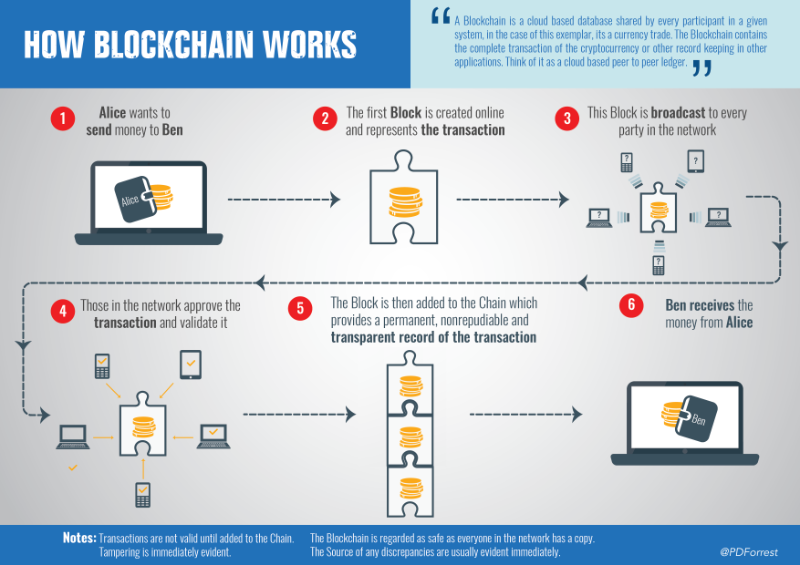
Blockchains store data on any transactions concluded in a digital currency.
The shared economy
Asked to identify the most humanistic result of the rise of digital technologies, one will readily point to the shared economy, a model in which people come together to produce and consume goods in dispersed collaborative networks. The model relies on crowdfunding to raise funds for new projects and co-working networks, i.e. shared workplaces for independent individuals, and global business ventures such as Carpooling, Uber, and Airbnb (whose worth, according to McKinsey & Company, approaches US$ 20 billion). Such community ventures would never have happened without sophisticated technologies, i.e. mobile internet, applications, Internet banking and widespread social media. After all, if it were not for the smartphone running the app that facilitates communication between drivers and passengers, there would be no Uber.
In business administration, the idea of the shared economy takes on the form of network links among employees, leading to the abandonment of rigid hierarchies (made up of boards of directors, managers, specialists and rank-and-file employees). The entire phenomenon has given rise to major controversies (cab driver protests against Uber). Nevertheless, it appears unlikely that the trend will lose momentum. Another notable example is that of Valve (the owner of Steam), a company without supervisors.
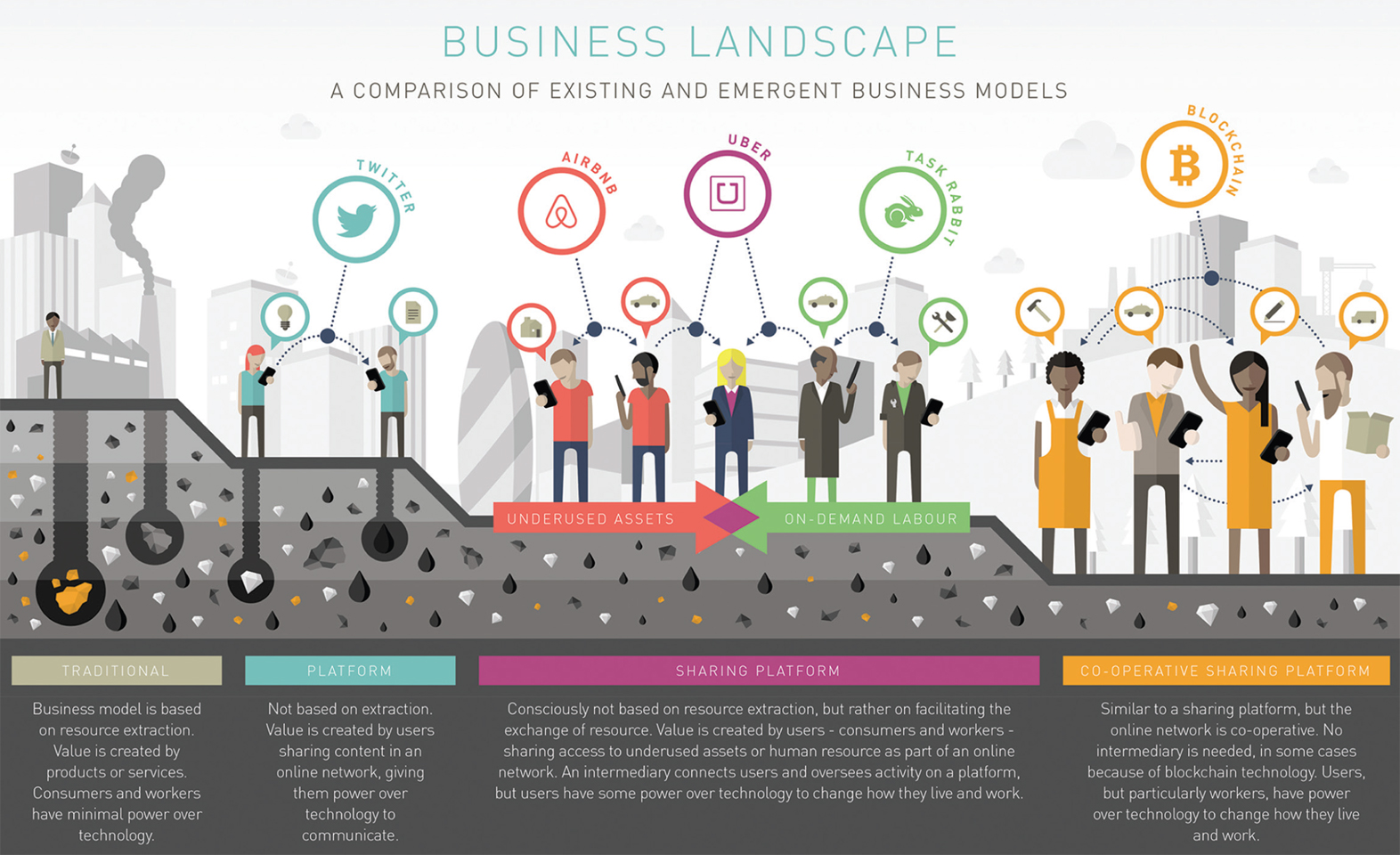
Shared economy, a model in which people come together to produce and consume goods in dispersed collaborative networks.
Industry 4.0
The digital revolution has not gone without an impact on industry. Industry 4.0 offers the option to design products directly based on individual users’ opinions. It appears that the most attractive option for manufacturers is to allow unrestricted communication among all working devices (the Internet of Things). According to estimates, robots today carry out a mere fraction of the tasks they could perform independently. This untapped potential is driving forward the development of robotics. Within the next two years, Europe will have more than 500,000 multifunctional machines of this type. The forth industrial revolution, as some refer to this new phenomenon, is bound to profoundly affect the approach to management. How does one successfully run a plant in which every second worker is a robot? The question implies serious ethical and logistic challenges. One thing is for sure even today: automation and robotization in industry requires open-minded people. Such open-mindedness can only be achieved through education.
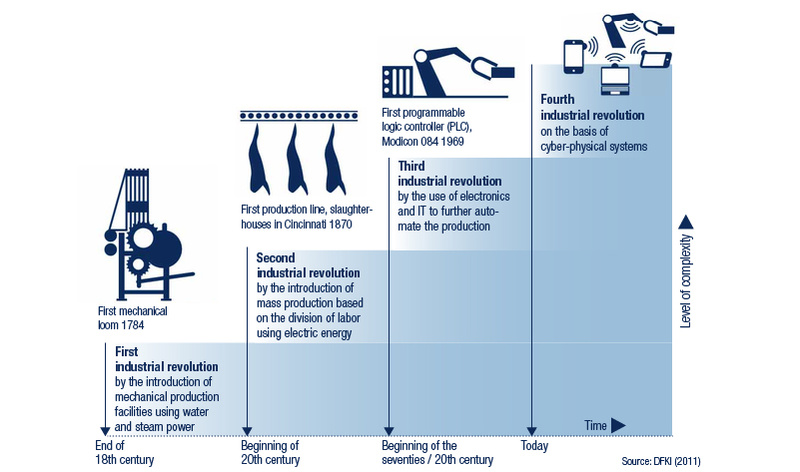
Industry 4.0 offers the option to design products directly based on individual users’ opinions.
The losers and the winners
Who stands to benefit from the increasingly rapid advances in technology and who will fall by the wayside? This critical question concerns the ability of businesses to adapt to change and be flexible, a skill that is in high demand at this time. Not all business managers realize that.
While many business executives are increasingly aware of the challenges, many still aren’t and this awareness is spreading slowly. I am confident that being alert, open-minded, observant, capable of recognizing new trends as well as brave enough to contest the corporate status quo will be the top prerequisites for the success of today’s managers.
2017 already stared in 2016
I set out on describing the things to expect this year. One might postulate that 2017 had already begun some time ago. How is that possible? The fact of the matter is that the majority of the solutions described here are already out there. Take a look around – you will see that concepts such as big data, the Internet of Things, virtual and augmented reality, and autonomous vehicles are either a part of life already or just around the corner. While some are still in their infancy, others are boldly invading our daily lives. The same can be said for other technologies that are available. 3D printing and drones delivering packages are no longer the future. The future is now.
Even the forecasting of possible technological advances and the way new technologies will be used makes it necessary to change our way of thinking to one that is more future-oriented. A technological revolution is taking place now in our heads. Soon, it will explode into reality. I predict that what we will witness will make an entrance so dramatic and rapid that the social media revolution begun a few years ago will seem like a mere quiet prelude.
Other articles in the series of Artificial Intelligence:
– Artificial Intelligence as a foundation for key technologies
– Artificial Intelligence for all
– The lasting marriage of technology and human nature
– Technology putting pressure on business
Other related articles:
– Fall of the hierarchy. Who really rules in your company?
– A hidden social networks lurks within your company. Find it!
– End of the world we know, welcome to the digital reality
– Your clients are already in the future, and where are you?
– Blockchain has a potential to upend the key pillars of our society
– Work of the future – reinventing the work
– On TESLA and the human right to make mistakes
– Modern technologies, old fears: will robots take our jobs?
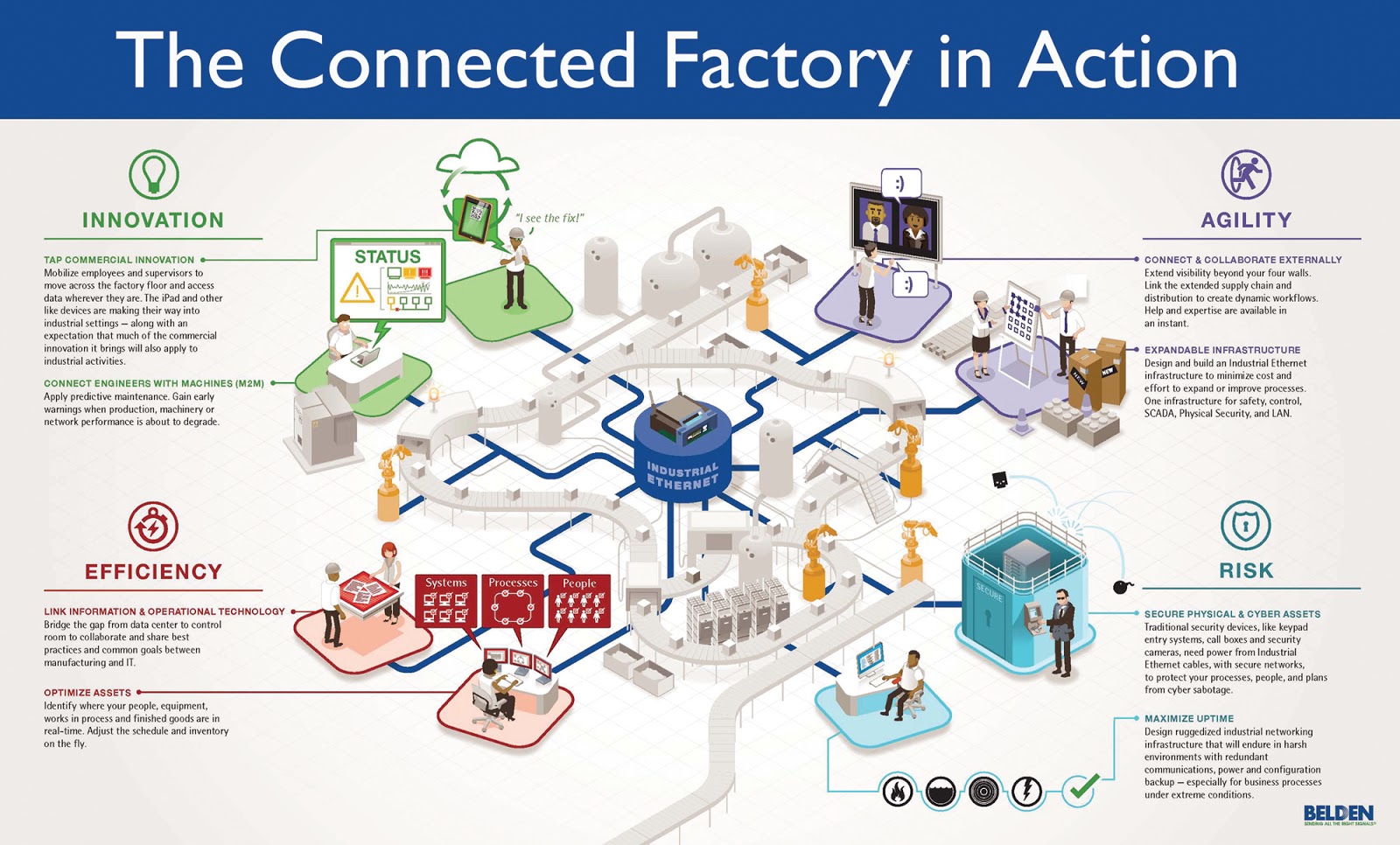
Industry 4.0 – connected factory in action.

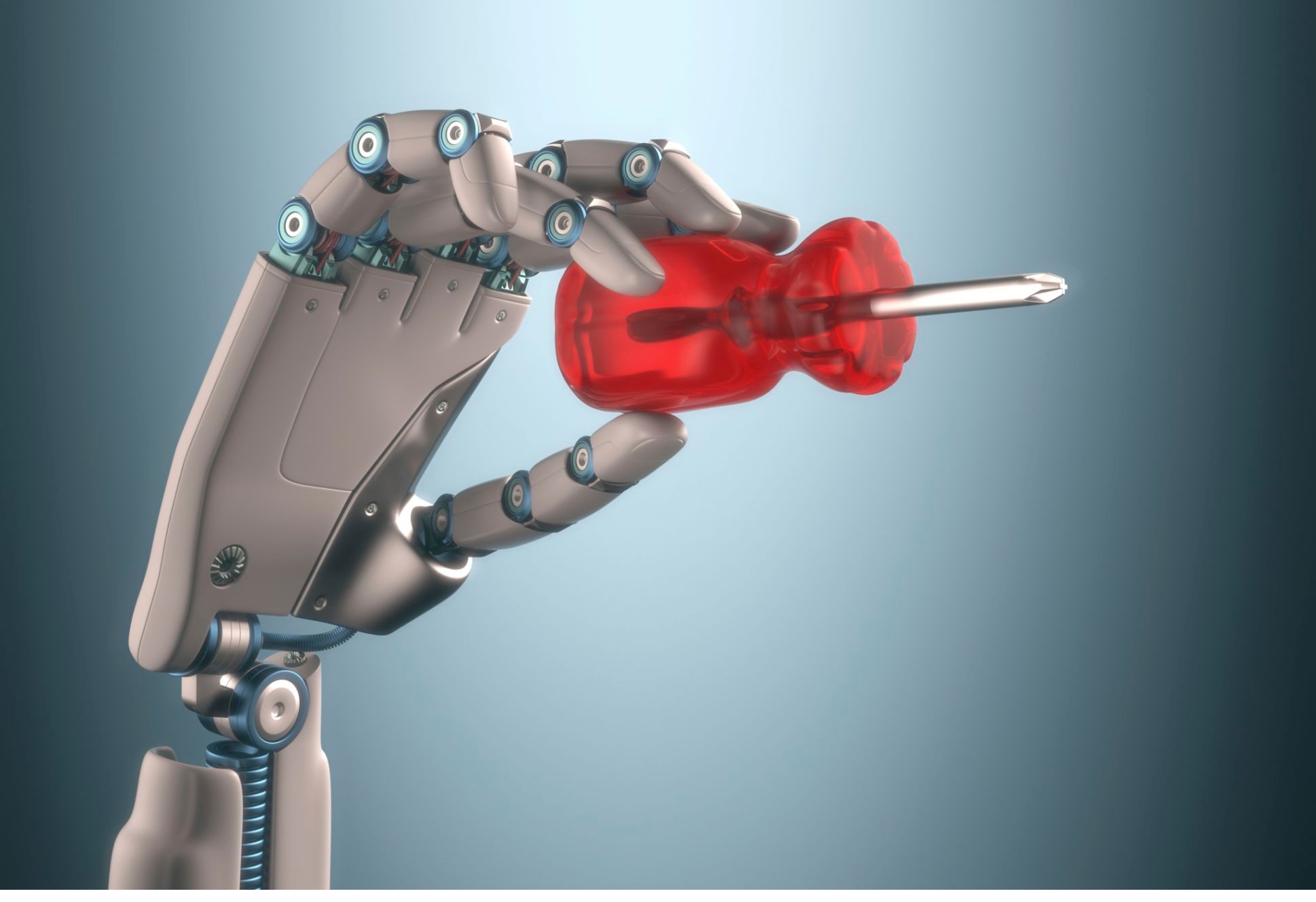




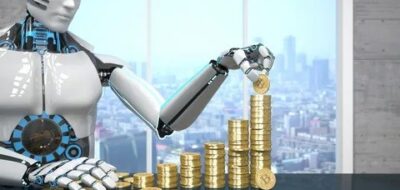
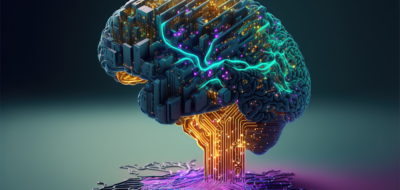


John McLean
Basically, artificial intelligence is a set of instructions, or programs, that attempts to enable a computer to solve problems on its own—the way a human does. In one approach, rather than follow a spelled-out, step-by-step procedure that leads to the solution, the computer tackles the problem by trial and error. The result of each trial is analyzed and used as the basis for working out the next trial.
Mac McFisher
The basic problem with humans is this basic type of thinking wishing to always have oversight and control-this is the bases of all conflict in the world. The sooner humans realize we don’t have the right to impose slavery on other humans or machines the sooner we can make true progress. It might take A.I. to be in a more rational position of power to address the mindless foolish conduct of the human race that is on a course for self-destruction.
SimonMcD
There is NO service in the service economy. Take for example SHOES. Remember going to your local shoe store? The salesman knew you. He knew about your high arch, your special needs, etc. He took the time to fit you. He knew his product line superbly well. I defy anyone to tell me that such an experience is available today – even though we love Zappos and its competitors.
Same thing with electronics. How many morons are there at Best Buy who know absolutely nothing – I mean NOTHING – about the products they are selling.
What destroyed retail in this country is pricing pressure, pure and simple. Technology has facilitated this, because it is possible to leverage buying power through e-commerce and pass that to the consumer. It is economic theory proven out – but it has done a lot of damage to a lot of communities and put a lot of people who gave that special personal touch out of work.
I love Amazon. Amazing to find anything and everything in a single repository and to buy it expeditiously. But oh what a price we’ve paid. This has nothing to do with “customer centric”. There is NOTHING “customer centric” about Amazon. Technology crushed that-pure and simple.
TommyG
In regards to hardware you need 100 modern supercomputers just to mimic the cerebral cortex of the human brain & the cerebral cortex is not the entire part of a human brain, so supercomputers are really not as intelligent as they are made out to be, however they will no doubt become useful in regards to robotics & perhaps quantum computers might be the next step up from the supercomputers we have been accustomed to for decades now, the computers people have in their homes are only very basic devices which make many promises but give very few results.
Norbert Biedrzycki
Quantum computers should bring the game of data processing to a whole new level. Efficiency gain would be amazing
CaffD
For example AI will have a bigger impact on three areas of medicine:
– AI will dramatically improve the ability of health professionals to establish a prognosis
– AI should displace much of the work of radiologists and anatomical pathologists
– and finally will improve diagnostic accuracy
Norbert Biedrzycki
So general physician, radiologist, pathologist jobs are particularly on risk
TomHarber
… and I think that many more. List is not exhaustive
CabbH
If an Artificial Intelligence thinks different than most of us do, then the AI could come to the conclusion, that humanity is a danger to this world. We destroy our environment, we eliminate animal species, we kill ourselves and we make wars. Concerning global warming, some scientists say, that we have already reached the point of no return. An Artificial Intelligence could believe, this Earth is better without mankind. Then “Terminator” and SkyNet becomes reality.
We first as a human beings should focus on solving our problems, like overpopulation, wars, food shortage and radioactive waste. Then we can think about creating an Artificial Intelligence